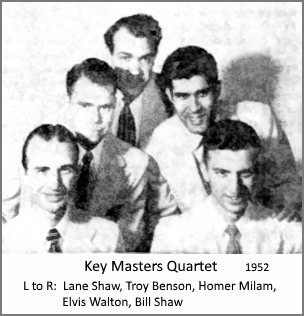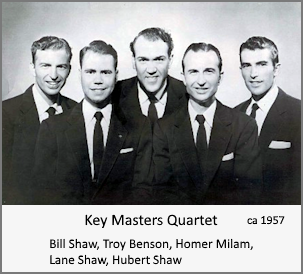 |
Group Members(Partial List) |
 |
Key Masters Quartet (1952-????)
In 1946, Lane Shaw and his brothers, Hubert, Billy, and Wendell, from the Birmingham, Alabama area, formed a group called "The Legionnaires." After around one year, Lane left and began singing with a series of groups including the Melody Masters in Lincoln, Nebraska and the All American Quartet in Mt. Vernon, Illinois.
Soon after leaving the All American Quartet in 1952, Lane Shaw and his brothers organized the Key Masters in Birmingham. By September 1952, the Key Masters Quartet was comprised of Billy Shaw (tenor), Lane Shaw (lead), Homer Milam (baritone), Elvis Walton (bass), and Troy Benson (pianist).
After a year or two Elvis Walton left, and Homer Milam then switched to bass. Hubert Shaw came in to fill the baritone slot.
From 1952 through 1959, in addition to singing in the region, the Key Masters made frequent road trips to Illinois where Lane Shaw had a following from his days with the All American Quartet. They appeared in concerts promoted by C.R. Melton, owner of the All American Quartet.
In 1959, Homer Milam left to join Elvis Walton and Dale Shelnut in the Rhythm Masters Quartet, also of Birmingham.
Newspaper ads from 1961 and 1962 listed the members as Billy, Lane, and Hubert Shaw along with H.L. Collins and Troy Benson. In 1963 the Key Masters made a number of regional appearances with the Thrasher Brothers, also from Birmingham. Around that time, Elvis Walton returned to sing bass.
By the mid-1960s, there were very few newspaper accounts of their activity. They did, however, continue to sing locally from time to time. Over the years, others joined the group, and the Key Masters name was kept alive until after the turn of the century.
